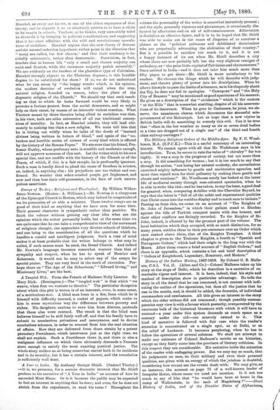The Military Religious Orders of the Middle-Ages. By F. C.
Wood- house, M.A. (S.P.C.K.)—This is a useful summary of an interesting history. We cannot agree with all that Mr. Wodehonse says in his introduction. To us, he seems to rate the value of" chivalry" far too highly. It was a step in the progress of society, but not more than a step. It did something for woman ; but it is too much to say that through its action, "not losing her natural modesty, she nevertheless exerciaed mighty influence by gentle and unobtrusive agencies, and more than repaid men for their gallantry by making them gentle and chaste and cautions." Mr. Woodhouse surely has looked at the inner life of mediseval society through rose-coloured spectacles, when he is able to write like this ; and he has taken, to say the least, a good deal for granted, when, comparing Achilles with the Chevalier Bayard, he says that the latter is "full of all the noble and supernatural qualities that Christ came into the world to display and to teach men to imitate." Passing on from this, we come on an account of "The Knights of St. John of Jerusalem," in which their gallant stand at Rhodes, against the tide of Turkish conquest meets with due honour, and their other conflicts are fittingly recorded. To the Knights of St. John, indeed, is allotted by far the greatest part of the volume. The local habitation which they occupied, with so much distinction, for so many years, entitles them to their pre-eminence over an Order which once ranked above them, that of the Knights Templars. A third chapter is given to the Teutonic Knights, a fourth to "Spanish and Portuguese Orders," which had their origin in the long war with the Moors. After them comes a brief account of "English Ordera;" and there is an appendix, which contains a list and brief description of "Orders of Knighthood, Legendary, Honorary, and Modern."


































 Previous page
Previous page